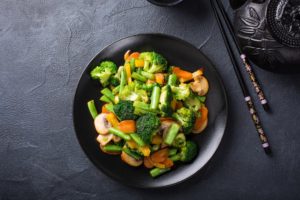 Do you fry your fish or bake it? What about vegetables—steamed or boiled? Or maybe you’re taking part in the pressure-cooking Instant Pot craze. Regardless, the way you cook impacts what you get out of food.
Do you fry your fish or bake it? What about vegetables—steamed or boiled? Or maybe you’re taking part in the pressure-cooking Instant Pot craze. Regardless, the way you cook impacts what you get out of food.
Omega-3 fatty acids, vitamin C, B-vitamins, and other nutrients and minerals can all be compromised or enhanced depending on your cooking method. While exposing certain nutrients to heat may increase their activity, in other cases, the nutritional value of food is degraded.
Advertisement
Boiling vegetables, for example, can drastically reduce the number of certain vitamins. Water-soluble vitamin C leaches into the water, potentially leading to a 50-percent reduction in vitamin C content. The only way to get the full value would be to drink the water you’ve used to cook your broccoli.
The same thing is true if you simmer meats. Valuable B-vitamins are liquefied and run out of the meat, and up to 60 percent of niacin, thiamin, and other B-vitamins may be lost in this cooking method.
Frying fish essentially eliminates the value of healthy omega-3s. The high heat damages the fat, causing it to lose up to 85 percent of its content. Baking it, on the other hand, only results in a minimal loss.
There are four major factors to take into account when trying to preserve foods’ nutritional value: cook time, exposure to water, temperature, and what you’re cooking.
Shorter cooking times tend to maximize nutrient retention and don’t require much water. Therefore, microwaving and pressure cooking are great options. Steaming vegetables is a great way to cook vegetables provided there is minimal water contact. Baking is also good for vitamin C retention.
Baking, however, isn’t great for B-vitamins. The combination of high heat and long cook times can lead to a 40 percent reduction in B-vitamins. On the other hand, the best way to cook meats may be by pressure cooker, stir fry, or pan fry.
Advertisement
Some cooking methods can activate nutrients in raw foods better than others. Two such examples are found in carrots and tomatoes. Research has indicated that beta-carotene—a potent antioxidant—found in carrots is absorbed at 6.5 times the rate when stir-fried versus raw. Other research has shown that when tomatoes are sautéed in olive oil, lycopene blood levels go up by 80 percent. Lycopene is a powerful antioxidant with a notable role in heart health.
How you cook can play a big role in the nutritional value of your food. If you’re eating a balanced, healthy diet, it might not make much of a difference, but it’s still nice to know how to get the most from every bite!
Also read:
- Cooking oils compared: Which to use or avoid for health benefits
- 8 superfood swaps to eat healthy on a budget
